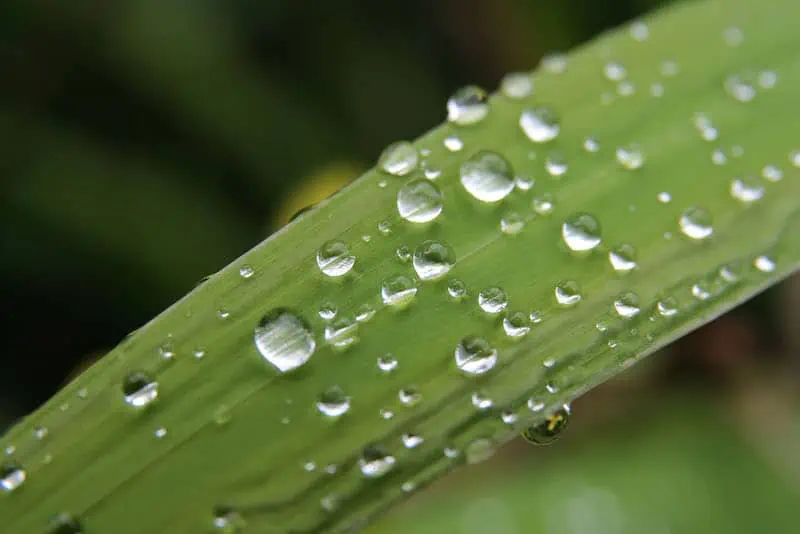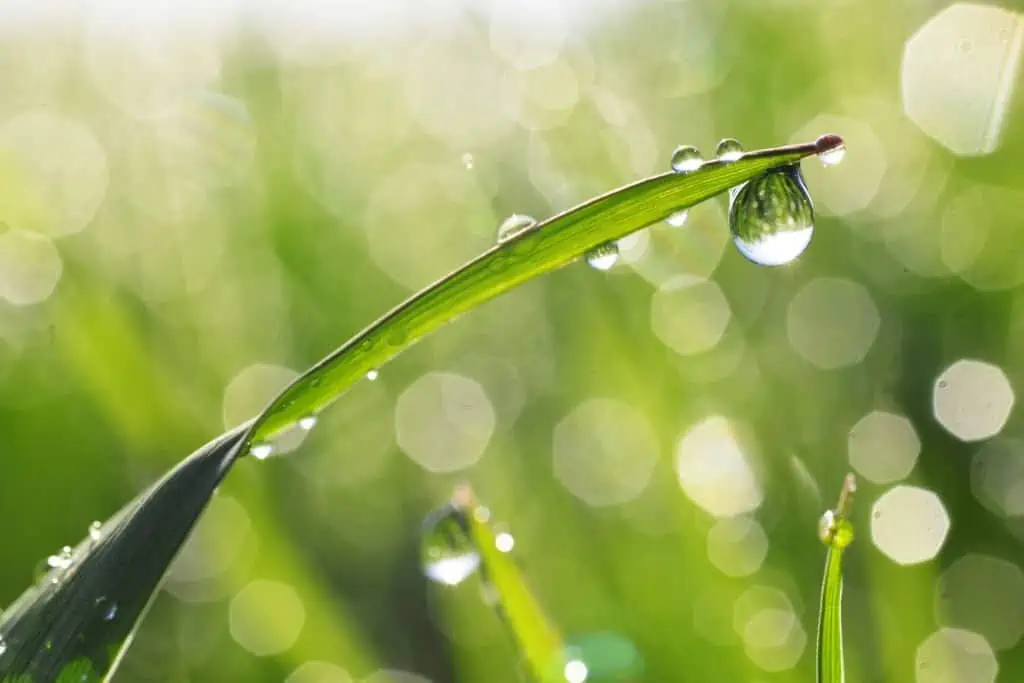Dew is a common occurrence that we see on our lawns and gardens every morning. But have you ever wondered if dew waters the grass?
This article will explore this topic and shed some light on the relationship between dew and grass.
What is Dew?
Dew is moisture that forms on surfaces in the early morning due to the cooling of the earth’s surface. It forms as the air temperature lowers, and moisture in the air condenses on surfaces such as leaves and grass blades.

These droplets then collect on surfaces, such as grass blades or leaves, creating the visible moisture we call dew. Dew provides a source of hydration and nutrients for plants, including grass.
Grass is a common plant that grows in many environments. It is peculiar for its green color and gets used in many applications such as lawns, landscaping, and sports fields.
How Does Dew Form?
Dew forms when the air temperature drops to the dew point, referred to as temperature when the air gets saturated with water vapor. This process can happen on clear nights when there is no cloud cover to trap heat near the earth’s surface. The surrounding air temperature also drops as the earth’s surface cools overnight.
Dew causes moisture in the air to condense onto surfaces. The amount of dew that forms depends on several factors, including temperature, humidity, and wind.
Furthermore, lower temperatures and higher humidity levels usually produce more dew. But wind causes moisture to evaporate faster, limiting the amount of dew that occurs.
Importance of Grass to the Environment
The grass is an essential part of our environment, and it plays a critical role in enhancing the balance and health of our ecosystems. It is not the simple plant we see everywhere but it provides several environmental benefits.
Aesthetic and Recreational Value
The grass is an important component of landscapes, providing aesthetic and recreational value. People often employ them in parks, golf courses, and residential landscaping to create pleasing and inviting green places.
Furthermore, grass provides a soft, cushioned surface ideal for outdoor activities, such as sports and picnics.
Biodiversity
Grass provides habitat and food for various wildlife species, including insects, birds, and mammals. It supports a diverse range of plant and animal life, promoting biodiversity and the health of ecosystems.
Carbon Sequestration
The grass is a natural carbon sink. It takes atmospheric carbon dioxide during photosynthesis, storing it in the soil and plant tissues. This process helps to mitigate the impacts of climate change by reducing the number of greenhouse gases in the atmosphere.
Economic Value
Grass has significant economic value, particularly in the agriculture and landscaping industries. It serves as a critical food source for cattle and helps to support grazing systems, which are essential to many agricultural operations.
Furthermore, grass also performs important landscaping and gardening functions. These include erosion prevention, soil enhancement, and weed suppression.
Soil Conservation
The grass is a natural soil stabilizer. It has a fibrous root system that holds the soil in place, reducing soil erosion and the loss of topsoil.
Additionally, it is imperative in areas where the soil is vulnerable to erosion, such as hillsides, riverbanks, and wetlands. Furthermore, grass filters contaminants and nutrients from runoff water, enhancing water quality.
Can Dew Water Grass?
The short answer is yes, dew can water grass. While dew does not provide as much moisture as rain, it can still provide some hydration to grass.
Dew can be particularly beneficial to grass during drought or in areas with limited access to water. But, it is important to note that dew alone may not provide enough moisture to keep the grass healthy and thriving.

The Relationship Between Dew and Grass
Dew and grass are two natural elements that are very intertwined. They play a vital role in the growth and health of grass, and understanding this relationship is vital for maintaining a healthy lawn. As the morning sun rises, the dew collected on grass blades evaporates, providing moisture for the grass to absorb.
This moisture is essential for maintaining healthy roots and promoting new growth. Additionally, dew can help to cool the surface of grass blades.
Furthermore, it reduces the risk of damage from high temperatures or sunlight exposure. This feature is necessary during hot summer months when the grass can become stressed and prone to damage.
Research Studies on the Effect of Dew on Grass
Several factors can impact the amount of dew on the grass, including temperature, humidity, and wind. Cooler temperatures and higher humidity levels generally lead to more dew formation. Wind can also impact the amount of dew on the grass by increasing the evaporation rate.
Over the years, researchers conducted several studies to investigate the effects of dew on the grass. Some of the research studies on the effect of dew on grass include the following;
Disease Resistance
Dew can help protect grass from disease. A study at the University of Illinois discovered dew can dilute the concentration of fungal spores on grass blades. This feature reduces the likelihood of fungal infections.
Heat Stress
Protection Research has also shown that dew can help protect grass from heat stress. A study by the University of California researchers discovered that grass with dew had lower leaf temperatures than grass without dew. This feature is important because high temperatures can cause stress to grass and lead to damage.
Hydration
In a recent study, researchers at the University of Florida discovered that dew can offer significant moisture to grass. The researchers examined the amount of water deposited on grass blades during dew formation and discovered that it might contribute up to 20% of grass’s daily water needs.
Nutrient Uptake
Another study by researchers at the University of Georgia found that dew can help grass absorb nutrients from the soil. The study found that grass with dew had higher nitrogen levels and nutrients than grass without. Furthermore, this research suggests that dew can enhance grass’s nutrient uptake and growth.
Seed Germination
Research has shown that dew can also play a role in seed germination. A recent study at the University of Arizona showed that dew can enhance the germination of seeds and promote early growth.
Benefits of Dew on the Grass
Dew plays a crucial role in maintaining a healthy and vibrant lawn. Without enough moisture, grass can get stressed, brown, and die. Dew can have several benefits for grass, including:
- Cools Surface of Grass: Dew can help cool the plants’ surface, reducing the risk of damage from high temperatures or sunlight exposure.
- Promotes Growth and Health: Enough moisture is necessary for grass development and health. And dew can offer some of the hydration required to keep grass appearing lush and green.
- Provides Moisture: Dew can provide some much-needed moisture to grass, especially during drought.
- Provides Nutrients: Dew also provides nutrients for the grass. As dew collects on grass blades, it can dissolve and carry trace amounts of minerals and nutrients essential for grass growth. This benefit is especially crucial for lawns that are not treated regularly or receive insufficient nutrients from the soil.
- Reduces Watering Needs: In areas with limited access to water, dew can help reduce the need for watering, saving time, money, and resources.
Conclusion
Dew can water the grass and provide some hydration to keep it healthy and thriving. While it may not provide as much moisture as rain, it can still benefit grass.
But, it is crucial to realize that just dew may not be sustainable for keeping the grass healthy, and more watering may be necessary in some circumstances. Understanding the interaction between dew and grass allows us to help care for our lawns and gardens, keeping them healthy and bright.
Sources
- Li, Y., Riedl, A., Eugster, W., Buchmann, N., Cernusak, L. A., Lehmann, M. M., Werner, R. A., & Aemisegger, F. (2023). The role of radiative cooling and leaf wetting in air–leaf water exchange during dew and radiation fog events in a temperate grassland. Agricultural and Forest Meteorology, 328, 109256. https://doi.org/10.1016/j.agrformet.2022.109256
- https://archive.lib.msu.edu/tic/flgre/article/1988fal12.pdf






